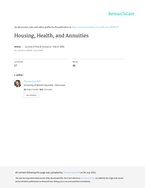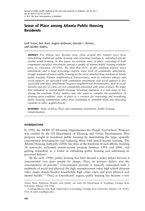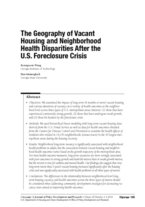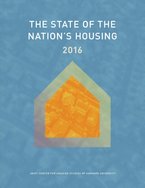Found 20 resources.
0
0
0
This report presents a case study of the Chicago Housing Authority’s (CHA’s) work requirement policy, one of a small number of work requirements implemented by housing authorities. The report describes the CHA work requirement, the policy’s implementation and how it has changed, and perceptions of implementation and outcomes from key CHA and service provider staff and residents. The CHA work requirement has been in place for nearly 10 years, allowing us to analyze implementation over time and outcomes.
Topics: Asset building, Legislation & Policy, Low-income, Midwest, Research
 Shared by Housing Is
on Apr 23, 2019
Shared by Housing Is
on Apr 23, 2019 0
0
0
Federal safety net programs are intended to protect the most vulnerable Americans—such as the elderly, people with severe disabilities and young children. Housing assistance plays a critical role in the safety net, providing decent, safe, and affordable housing for millions of extremely low-income and vulnerable families—though, because it is not an entitlement like other federal safety net programs, the assistance available falls far short of the need. Housing subsidies free families to spend on other essentials like healthy food, education, and health care.
Topics: Asset building, Dual-generation, Education, Housing, Mental health, Mobility, Partnerships, Research, Workforce development
 Shared by Housing Is
on Apr 2, 2019
Shared by Housing Is
on Apr 2, 2019 0
0
0
Housing is at the epicenter of all opportunities and outcomes. It is the first rung on the ladder to economic opportunity, and a person’s access to opportunity is linked with that of their community. From health, to economic mobility, to educational opportunity, to racial equity, and beyond, housing shapes families and communities.
Topics: Asset building, Education, Health, Homelessness, Housing, Low-income, Mobility, Racial inequalities
 Shared by Housing Is
on Mar 28, 2019
Shared by Housing Is
on Mar 28, 2019 0
0
0
Because mental health conditions can negatively affect employment, people with these conditions make up a large share of federal disability program participants. Federal agencies have tested supported employment (SE) interventions designed to help those with mental health conditions keep or obtain employment and reduce their dependence on public programs. This brief describes the characteristics of adults with mental health conditions who participate in the federal disability programs and reports evidence from three recent studies of longer-term impacts of SE on the employment of people with...
Topics: Asset building, Disabilities, Mental health, Research, Workforce development
 Shared by Housing Is
on Mar 18, 2019
Shared by Housing Is
on Mar 18, 2019 0
0
0
The employment social enterprise (ESE) model can provide an opportunity to create a financially viable business that helps individuals with employment barriers become integrated into the labor force. This research studied eight ESEs. Findings suggest that by applying private‐sector business principles to a workforce development programs, social enterprises can provide participants with meaningful and valuable work experience, while offsetting program costs. Analysis identified four promising practices that social entrepreneurs should adopt when setting up a new enterprise. Enterprises should...
Topics: Asset building, Low-income, Research, Workforce development
 Shared by Housing Is
on Mar 18, 2019
Shared by Housing Is
on Mar 18, 2019 0
0
0
As a result of decades of legalized discrimination in the housing industry, huge racial disparities in homeownership still exist today. This is not acceptable in a country founded on equal opportunity. Nationally, 72 percent of white households own a home, compared to only 42 percent of black households and 46 percent of Hispanic households. Homes typically make up the largest portion of a family’s overall wealth, so these disparities in homeownership are the most significant factor in the racial wealth gap.
Topics: Asset building, Housing, Legislation & Policy, Racial inequalities
 Shared by Housing Is
on Mar 11, 2019
Shared by Housing Is
on Mar 11, 2019 0
0
0
In many cities, low-income residents live far from available jobs, and employers can’t find people to fill open positions. Economists call this “spatial mismatch”—a mismatch between where jobs are located and where job seekers live, which can cause high unemployment rates and lead to longer spells of joblessness.
Topics: Asset building, Racial inequalities, Research, Transportation, Workforce development
0
0
0
As the US Department of Housing and Urban Development (HUD) prioritizes programs to help households receiving rental assistance achieve economic self-sufficiency, researchers, policymakers, and advocates debate the utility of work requirements as an effective pathway toward economic self-sufficiency and the risks of offering rental assistance on a conditional basis. This study contributes additional evidence suggesting that work requirements, when implemented gradually and in context with hardship exemptions and local supports, can boost annual household income, earnings, and the adult-...
Topics: Asset building, Housing, Legislation & Policy, Low-income, Research, Workforce development
 Shared by Housing Is
on Feb 21, 2019
Shared by Housing Is
on Feb 21, 2019 0
0
0
To explore the benefits and challenges of rapid re-housing support services, How Housing Matters asked a group of experts to weigh in. Contributing to the discussion are Kathryn Monet, chief executive officer at the National Coalition for Homeless Veterans, Jacob Donnelly, director of supportive services at Swords to Plowshares, and Samantha Batko, research associate at the Urban Institute.
Topics: Asset building, Health, Homelessness, Housing, Low-income, Supportive housing, Workforce development
 Shared by Housing Is
on Jan 24, 2019
Shared by Housing Is
on Jan 24, 2019 0
0
0
Affordable housing campaigns are not new, of course, but what is unprecedented and transformative about Opportunity Starts at Home is the scope and diversity of the partners that are joining forces to advocate for more robust and equitable federal housing policies. The campaign is advised by a Steering Committee including leading national organizations representing a wide range of interests that are working shoulder-to-shoulder to solve the affordable housing crisis.
Topics: Asset building, Child welfare, CLPHA, Community development, Early childhood, Education, Food insecurity, Funding, Health, Homelessness, Housing, Immigrants, Legislation & Policy, Low-income, Mobility, Out-of-school time, Partnerships, Racial inequalities, Safety, Seniors, Stability, Substance abuse, Youth
0
0
0
Safe, affordable housing enables low-income people to climb up the income ladder and achieve the American Dream.
Topics: Asset building, Housing, Mobility, Partnerships, Research
0
0
0
We undertake the first rigorous evaluation of financial coaching using a randomized controlled trial at two sites. We estimate both treatment uptake and treatment outcomes, including intent to treat estimates and complier average causal effects.
Topics: Asset building, Low-income, Mobility, Research
0
0
0
Are families prioritizing their housing payments by jeopardizing their health and well-being, missing utility payments, skipping meals, or failing to keep up with medical needs or medical bills? And are renters less able than homeowners to weather a financial emergency, such as an unexpected medical expense? Our research suggests this may be the case.
Topics: Asset building, Child welfare, Food insecurity, Health, Homelessness, Housing, Low-income, Research, Stability
0
0
0

Many low-income families in the United States face challenges associated with unemployment, health, and education disparities. To help overcome these challenges, several federal programs aim to assist these families with employment, self-sufficiency, healthy relationships, and individual well-being. Understanding the effects of these programs, including whether they meet the needs of those they intend to serve, requires a strong partner. Mathematica’s team of seasoned experts has worked closely with the Administration for Children and Families (ACF), Office of Planning, Research, and...
Topics: Asset building, Child welfare, Dual-generation, Family engagement, Low-income, Research, Stability
0
0
0
In contrast to the portrayal of homelessness as affecting people with behavioral health problems or low employment capacity, cycles of homelessness could reflect job shifts that bring a household in or out of poverty. To assess the connections between employment and homelessness, researchers focused on three topics: (1) employment and earnings before, during, and after adults used a homeless shelter; (2) changes in employment and earnings in connection to shelter entry and exit; and (3) employment and earnings differences between adults who are homeless as part of a family versus as...
Topics: Asset building, Homelessness, Housing, Low-income, Research, Stability, Workforce development
0
0
0
Annuities, long-term care insurance (LTCI), and reverse mortgages appear to offer important consumption smoothing benefits to the elderly, yet private markets for these products are small. A prominent idea is to combine LTCI and annuities to alleviate both supply (selection) and demand (liquidity) problems in these markets. This paper shows that if consumers typically liquidate home equity only in the event of illness, then LTCI and annuities become substitutes and less attractive. Simulations confirm that without home equity loans, both LTCI and constant real annuities may be welfare...
Topics: Asset building, Health, Housing, Medicaid / Medicare, Seniors
 Shared by Housing Is
on Aug 9, 2018
Shared by Housing Is
on Aug 9, 2018 0
0
0
For almost two decades now, cities around the country have been demolishing traditional public housing and relocating residents to subsidized private market rental housing. In this paper, we examine sense of place, consisting of both community and place attachment, among a sample of Atlanta public housing residents prior to relocation.
Topics: Asset building, Housing, Legislation & Policy, Low-income, Mental health, Mobility, Research, South, Stability
 Shared by Housing Is
on Aug 9, 2018
Shared by Housing Is
on Aug 9, 2018 0
1
0
We examined the impact of long-term (6 months or more) vacant housing and various durations of vacancy on a variety of health outcomes at the neighborhood level across three types of U.S. metropolitan areas (metros): (1) those that have experienced consistently strong growth, (2) those that have undergone weak growth, and (3) those hit hardest by the foreclosure crisis
Topics: Asset building, Asthma, Community development, Health, Housing, Low-income, Mental health, Metrics, Research, Safety, Transportation
 Shared by Housing Is
on Aug 1, 2018
Shared by Housing Is
on Aug 1, 2018 0
0
0
SAHF members believe that connecting residents of affordable housing with needed supports – such as educational resources or health services – can help vulnerable families and seniors achieve
a better quality of life. SAHF began the Outcomes Initiative to create a common framework for its members to demonstrate with data the impact on residents of providing housing-based services and support in the five key areas listed below.
Topics: Asset building, Cost effectiveness, Dual-generation, Education, Exercise, Food insecurity, Health, Housing, Mental health, Metrics, Nutrition, Safety, Stability
 Shared by Housing Is
on Jul 26, 2018
Shared by Housing Is
on Jul 26, 2018 0
0
0
The need for more affordable rental housing is urgent. The record number of renters paying more than half their incomes for housing underscores the growing gap between market-rate costs and the rents that millions of households can afford. Governments at all levels must redouble their efforts to expand the affordable supply. And with growing recognition that children’s lifelong achievement rests on stable, safe, and healthy living conditions, policymakers must also ensure better access of minority and low-income households to higher opportunity communities.
Topics: Asset building, Housing
 Shared by Housing Is
on Jul 20, 2018
Shared by Housing Is
on Jul 20, 2018 



